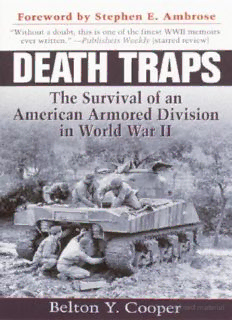
Death Traps: The Survival of an American Armored Division in World War II PDF
Preview Death Traps: The Survival of an American Armored Division in World War II
Table of Contents Title Page Dedication Acknowledgments Praise Foreword Preface Introduction 1 - Reflections On Board the LST to Normandy Crossing the Atlantic The Bocage and the Hedgerows Combat Command A: Action at Villiers-Fossard 2 - First Combat Combat Command B Actions at Airel, Pont Hébert, and Vents Heights Tragic Inferiority of the M4 Sherman Tank Tree Snipers Thoughts on the Reality of Combat More Tank Losses The German Counterattack: Tanks and Infantry in the Hedgerows The Gas Attack 3 - The Breakthrough Preparation: The Hedge Chopper Planning Operation Cobra and the Saint-Lô Breakout The Danger of Smoking in a Foxhole The Bombardment New Mission for Air Support Operation Spark Plug Lessons from Operation Cobra 4 - The Falaise Pocket Breakthrough Becomes Breakout The Battle of Mortain Northeast Toward Falaise General Rose Assumes Command Closing the Falaise Pocket Regrouping After Falaise Tank Recovery in Combat A New Commanding Officer To Paris and Across the Seine 5 - From Paris to Soissons Logistic Innovations Ordnance Innovations Advance from Paris to the Northeast Soissons and Laon: Battleground of World War I The Roadblock at Maubeuge A Meeting Engagement at Mons Attack on Charleroi Liège: The Heaviest Fortified European City Verviers to the Siegfried Line 6 - Assault on the Siegfried Line The Siegfried Line Attack Through the Dragons’ Teeth The Division Regroups The Battle of Aachen Buildup to the Breakout Through the Siegfried Line The Assault to the Roer River The Failure of the November Offensive 7 - The Battle of the Bulge: Phase I, the German Attack Status of the Division Prior to the German Attack The German Attack The American Defense Stavelot–Trois Ponts–Stoumont–La Gleize 8 - The Battle of the Bulge: Phase II, the Counterattack The Germans Regroup 3d Armored Division at Hotton-Manhay German Air Attack My Driver, White, Is Wounded A Problem with Frostbite The (VT) Proximity Fuse The American Counterattack Casualties On Leave to Reims 9 - Back to Germany Return to Aachen Trading with the Enemy The Western Front: February 1, 1945 Ordnance Problems The First New M26 Tanks Arrive The Roer River Line Sleeping on a UXB New Maps of Germany 10 - Battle of the Rhineland Attack Across the Rhineland The Super Pershing M26A1E2 Tank Arrives The Assault on Cologne 11 - The Battle of Central Germany The Western Front, March 23, 1945 The Remagen Bridgehead Envelopment of the Ruhr Pocket Major General Maurice Rose Is Killed in Action Annihilation of a Task Force Closing the Ruhr (Rose) Pocket 12 - Final Thrust Across Germany The Tragedy at Nordhausen The V2 Rocket Factory The Final Assault 13 - The Aftermath V-E Day Darmstadt and the Army of Occupation The First Industrial Survey of Postwar Germany Reflections on the Aftermath 14 - The Survivors The French Riviera The Bomb The Survivors Appendices Epilogue: The Coin Suggested Reading BLACK SHEEP ONE Copyright Page To the brave men of the 3d Armored Division who gave their lives so that those of us remaining, by the Grace of Almighty God, could become survivors. Acknowledgments I would like to acknowledge several people who helped me write this book, not necessarily in the order of their importance. While still in Germany, I confided my thoughts to my buddy, Lt. Earl Binckley, who continually prodded me to tell my story. Dr. James Tent, professor of history, University of Alabama at Birmingham, was encouraging and introduced me to Dr. Stephen E. Ambrose. Dr. Ambrose reviewed my manuscript and used it as a reference for his book, Citizen Soldiers. As a result of this, Dr. Ambrose graciously consented to write the foreword for this book. Dr. Russell Weigley, professor of military history, Temple University; Lt. Col. Lee Clark, Commandant of the Armored Force School, Fort Knox; John Purdy, director of the Patton Museum; Bill Hanson, director of the Armored Forces School Library; Colonel Elder, CO of the 16th Cavalry Regiment; Hanes Dugan, historian of the 3d Armored Division; Clarence Smoyer of E Company, 32d Armored Regiment. My family: my wife Rebecca; my sons, Belton, Lloyd, and Spencer; and Lloyd’s wife, Tish, were patient, helpful, and encouraging. My secretary, Betty Hartwell, did much of the typing. Mike Bennighof, a doctoral candidate in history, did an excellent job of editing my original manuscript. The photographs were furnished courtesy of Ernie Nibbelink, Earl Binckley, Clarence Smoyer, and Marvin Mischnick. I am indebted to Sheila Criss for producing the maps. Deborah Baxter Swaney provided considerable help with proofreading the manuscript. I am indebted to Bob Kane, Richard Kane, and E. J. McCarthy of Presidio Press for their guidance and professionalism.
